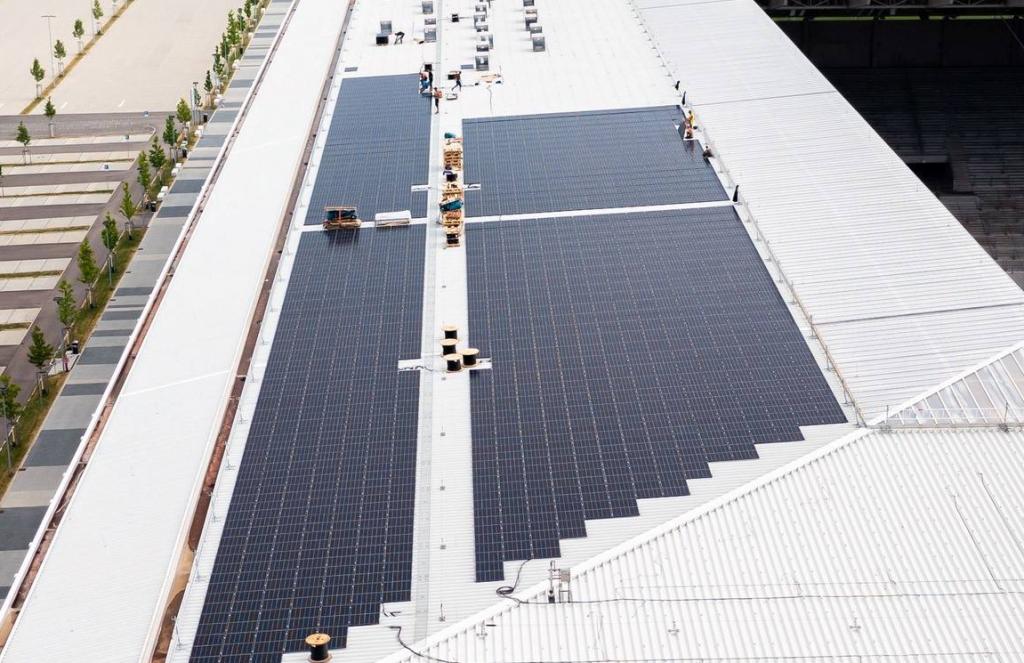Thessaloniki gets ready for its metro launch in November
The underground rapid transit lines have been under construction for almost two decades due to various project delays
 TheMayor.EU logo
TheMayor.EU logo 
The 6,000 PV moduled should produce around 2.3 million kilowatts a year, Source: badenova on Facebook
Freiburg’s Europa Stadium should be able to produce almost all the energy it needs with renewable sources on site
Yesterday, authorities in Freiburg, Germany, announced that the project to build a photovoltaic system on the roof of the local Europa Park stadium was underway. The finished system would be the largest of its kind in Germany and one of the largest in the world, contributing to Europa Park’s overall sustainable energy scheme.
The photovoltaic cells are being installed with investments from the local ‘badenova’ energy company, the local government and the Freiburg Sports Club. According to a statement by Mayor Martin Horn, the installation will cost around 2.3 million euros.
The installation would cover 15,000 square meters and include 6,000 individual solar modules. Their estimated combined output is around 2.3 million kilowatts per year, which is supposed to cover all the stadiums’ needs, making it CO2 neutral.
One of the most interesting facts about the Europa Park is that it has a robust sustainable energy scheme, that is supposed to make the facility carbon neutral. Apart from the photovoltaic system currently under construction on the roof, the stadium uses waste heat from the nearby industrial zone.

The new stadium in Freiburg has a robust sustainability concept,
Source: Andreas Schwarzkopf on Wikipedia, CC BY-SA 4.0
According to official sources, these two components should be able to cover the stadiums’ annual energy consumption. The parking lot of the stadium is also home to a number of electric vehicle charging stations. At the same time, however, it also features a diesel-powered generator, if there is an energy outing. The generator is specifically aimed at powering television broadcasts.
The local football team, FC Freiburg, used to be based in the 1954 Dreisamstadion, however, as the new century rolled around, the structure proved to be outdated and ill-equipped. In 2012, the local council voted to construct a new one and works officially started in early 2020.
Europa Park was officially opened in October 2021, when Freiburg played a friendly game with FC St Pauli.

The underground rapid transit lines have been under construction for almost two decades due to various project delays

Now you can get your wine in Talence by paying directly in Bitcoin

That’s because the state has to spend money on updating the railway infrastructure rather than subsidizing the cost of the popular pass

Rethinking renewable energy sources for the urban landscape

The examples, compiled by Beyond Fossil Fuels, can inform and inspire communities and entrepreneurs that still feel trepidation at the prospect of energy transition

Now you can get your wine in Talence by paying directly in Bitcoin

The 10th European Conference on Sustainable Cities and Towns (ESCT) sets the stage for stronger cooperation between the EU, national and local level to fast track Europe's transition to climate neutrality.

At least, that’s the promise made by the mayor of Paris, Anne Hidalgo

The underground rapid transit lines have been under construction for almost two decades due to various project delays

At least, that’s the promise made by the mayor of Paris, Anne Hidalgo

Hostal de Pinós is located in the geographical centre of the autonomous region

Despite its church-y name, the district has long been known as the hangout spot for the artsy crowds

Urban dwellers across the EU are having a say in making their surroundings friendlier to people and the environment.

Forests in the EU can help green the European construction industry and bolster a continent-wide push for architectural improvements.

Apply by 10 November and do your part for the transformation of European public spaces

An interview with the Mayor of a Polish city that seeks to reinvent itself

An interview with the newly elected ICLEI President and Mayor of Malmö

A conversation with the Mayor of Lisbon about the spirit and dimensions of innovation present in the Portuguese capital














